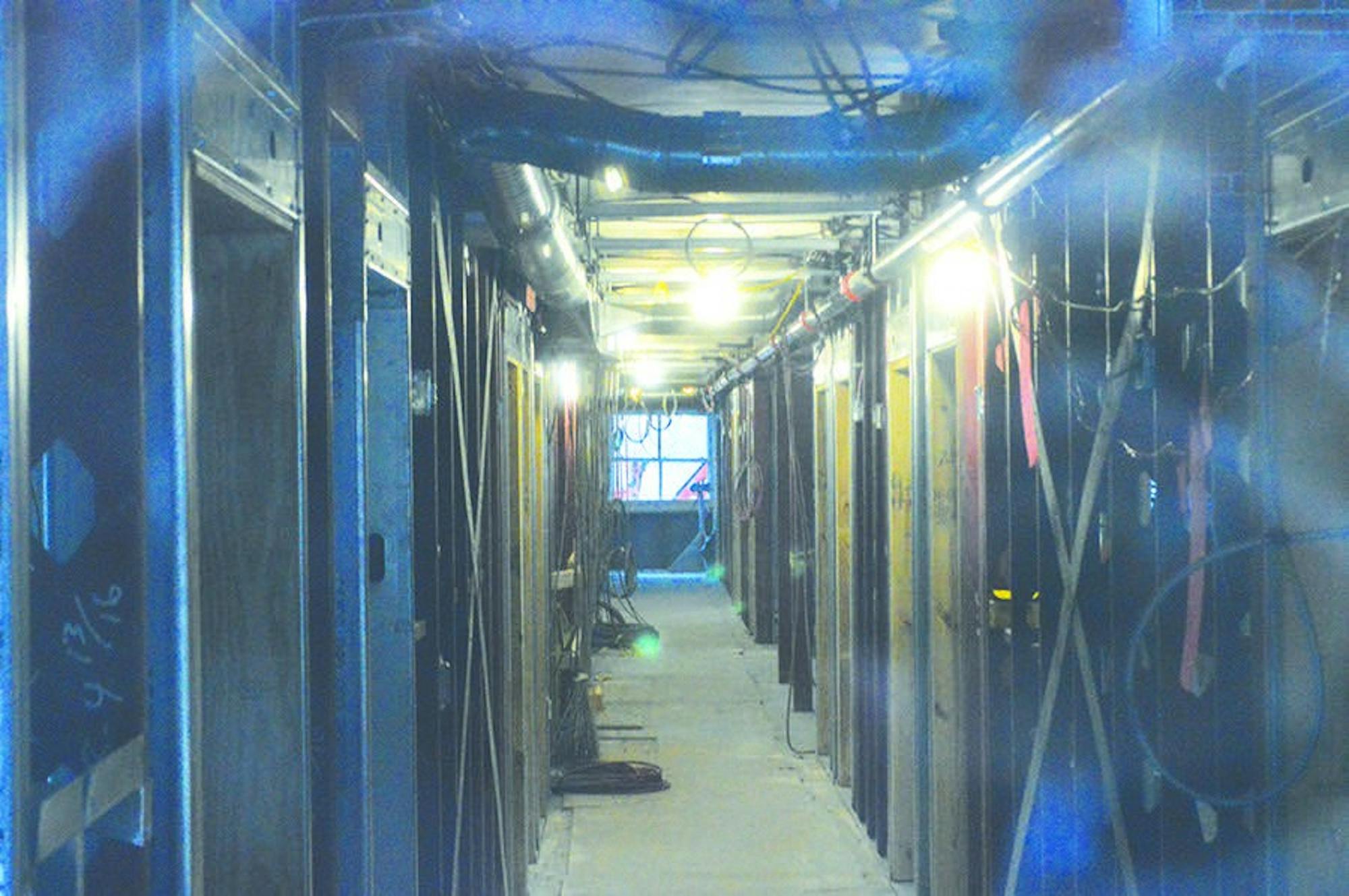The reconstruction of Morton Hall dormitory following last fall’s fire is expected to finish this summer, according to associate dean of residential life Michael Wooten. The building will house 84 students and assistant director of residential education for East Wheelock Josiah Proietti this fall. Construction began soon after the Oct. 1 fire caused by an unattended hibachi-style grill on the roof that left the building uninhabitable.
Original plans to restore Morton expanded to include redesigning the building, which was originally constructed in the 1980s. The College’s Board of Trustees approved the renovation on March 3, according to the campus services website.
The residence hall, which had 67 beds and no elevator before the fire, will now have 84 beds and an elevator in the area that was previously a center stairwell, as well as common spaces on each floor and temperature controls in every room. By eliminating Morton’s former suite-style floor plan in favor of a layout of singles, singles with private baths and doubles, the College will house 17 additional students in Morton compared to the prior design. Morton will have more single rooms than before and the same number of singles with private baths, Wooten said.
The common spaces will accommodate approximately 25 students and will be used for First-Year Residential Experience meetings between undergraduate advisors and their residents as well as for resident studying.
The mechanical, electrical and fire protection systems and elevator shaft construction will continue this week, according to the campus services website.
Both Proietti and Wooten were involved in designing Morton, and both cited creating space for programming as a priority.
Wooten is optimistic about the expected results of the newly renovated Morton Hall. He said the mix of singles and double rooms will better suit student preferences and the common spaces will be conducive to a community atmosphere. Overall, it will be a “nicer space than it was before,” Wooten said.
East Wheelock house professor Sergi Elizalde sees the construction daily from his residence’s living room window. While he said the noise of a construction site is not ideal, Elizalde was impressed with the speed and progress of the project.
“I don’t think it could be done any faster,” Elizalde said.
Students can choose to live in Morton during the fall term room draw.
Following the fire, Morton’s 67 residents and Proietti were displaced.
The College compensated all students who sought reuimbursement for the cost of their damaged belongings and relocated them to new rooms. Former UGA of Morton’s first and second floors Taringana Guranungo ’18 and UGA of Morton third and fourth floors Issa Sylla ’17 both said they received compensation for their damaged items. Morton fourth floor resident Lillian Zhao ’19 and third floor resident Ellen Smalley ’19 both said they were initially told they would need insurance to cover the damages.
The College’s dearth of housing accommodations caused some Morton residents to be placed in “creative” situations and “non-traditional beds” after the fire, Wooten said. Some students were housed in converted lounges or other residences on campus typically used for graduate students or new faculty members. Some of the displaced students are still residing in these spaces.
Proietti said that Morton’s vacancy made the East Wheelock community quieter and negatively impacted revenue at the East Wheelock snack bar.
Elizalde said the dispersal of the former Morton Hall residents across campus slightly decreased participation in house events.
After the fire, Guranungo and Sylla lived in a converted McCulloch Hall lounge for the remainder of the fall term. Guranungo then moved to North Fayerweather Hall to serve as a UGA there for the winter and spring terms. Sylla became a UGA for Fahey Hall.
Guranungo said he stopped thinking about the fire during winter term and does not resent the students who started the fire.
“As for me, it’s kind of a thing of the past, at this point,” Guranungo said. “And even some of my residents, they forgot about it. Some of them were off last term, and when they came back, it was like it didn’t really happen. For some, maybe it’s different.”
Zhao said that the initial effects of the fire caused a “major disruption academically,” but now tells the story of the fire as a unique experience.
“At this point, it’s kind of one of those stories you tell and people say, ‘Wow, that’s really wild,’” Zhao said.
Sylla said although moving multiple times in his senior year was difficult, the Morton fire does not still impact him. Sylla also mentioned he is thankful that all Morton Hall residents were safe and that most material possessions lost were replaceable.
“I wouldn’t put [the fire] down as one of the major things that impacted my senior year because I’m just very grateful nobody was hurt, and the things that we lost were, more or less, replaceable,” Sylla said.
Sylla also said that while some of the initial housing conditions were “unfavorable” for some residents after the fire, such as living in the basement of French Hall, most of his former residents moved to “better” accommodations than than their initial housing.
Guranungo’s main concern is whether the construction will be finished by the fall.
If assigned to be a Morton UGA next year, Guranungo said he had no reservations about moving back into the building because it would be a new and renovated space. Proietti, who will be moving back into Morton Hall upon the completion of the renovation, voiced similar sentiments.
Alexandra is a ’20 from New York and is unsure of what she plans to study, but has interests in neuroscience, geography, and human-centered design. Alexandra has written for The D since her freshman fall, and she enjoys meeting people and learning about various groups on campus through her articles.




